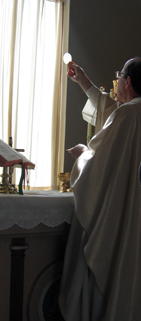Is there delight in contemplation?
 “Objection 1. It would seem that there is no delight in contemplation, for delight belongs to the appetitive power, whereas contemplation resides chiefly in the intellect. Therefore it would seem that there is no delight in contemplation.
“Objection 1. It would seem that there is no delight in contemplation, for delight belongs to the appetitive power, whereas contemplation resides chiefly in the intellect. Therefore it would seem that there is no delight in contemplation.“Objection 2. Further, all strife and struggle is a hindrance to delight. Now there is strife and struggle in contemplation. For Gregory says (Hom. xiv in Ezech.) that ‘when the soul strives to contemplate God, it is in a state of struggle; at one time it almost overcomes, because by understanding and feeling it tastes something of the incomprehensible light, and at another time it almost succumbs, because even while tasting, it fails.’ Therefore (it would seem that) there is no delight in contemplation.
“Objection 3. Further, delight is the result of a perfect operation, as stated in Ethic. x, 4. Now the contemplation of wayfarers is imperfect, according to 1 Corinthians 13:12: ‘We see now through a glass in a dark manner.’ Therefore seemingly there is no delight in the contemplative life.
“Objection 4. Further, a lesion of the body is an obstacle to delight. Now contemplation causes a lesion of the body; wherefore it is stated that after Jacob had said, ‘”I have seen God face to face” . . . he halted on his foot. . . because he touched the sinew of his thigh and it shrank’ (Genesis 32:30-32). Therefore seemingly there is no delight in contemplation.
“On the contrary: It is written of the contemplation of wisdom (Wisdom 8:16): ‘Her conversation hath no bitterness, nor her company any tediousness, but joy and gladness’: and Gregory says (Hom. xiv in Ezech.) that ‘the contemplative life is sweetness exceedingly lovable.’

“I answer that: there may be delight in any particular contemplation in two ways.
“First, by reason of the operation itself [Cf. I-II, 03, 5] because each individual delights in the operation which befits him according to his own nature or habit. Now contemplation of the truth befits a man according to his nature as a rational animal: the result being that 'all men naturally desire to know,' so that consequently they delight in the knowledge of truth. And more delightful still does this become to one who has the habit of wisdom and knowledge, the result of which is that he contemplates without difficulty.
 “Secondly, contemplation may be delightful on the part of its object, in so far as one contemplates that which one loves; even as bodily vision gives pleasure, not only because to see is pleasurable in itself, but because one sees a person whom one loves.
“Secondly, contemplation may be delightful on the part of its object, in so far as one contemplates that which one loves; even as bodily vision gives pleasure, not only because to see is pleasurable in itself, but because one sees a person whom one loves.“Since, then, the contemplative life consists chiefly in the contemplation of God, of which charity is the motive, as stated above (1 and 2, ad 1), it follows that there is delight in the contemplative life, not only by reason of the contemplation itself, but also by reason of the Divine love.
“In both respects the delight thereof surpasses all human delight, both because spiritual delight is greater than carnal pleasure, as stated above (I-II, 31, 5), when we were treating of the passions, and because the love whereby God is loved out of charity surpasses all love. Hence it is written (Psalm 33:9): ‘O taste and see that the Lord is sweet.’
“Reply to Objection 1. Although the contemplative life consists chiefly in an act of the intellect, it has its beginning in the appetite, since it is through charity that one is urged to the contemplation of God. And since the end corresponds to the beginning, it follows that the term also and the end of the contemplative life has its being in the appetite, since one delights in seeing the object loved, and the very delight in the object seen arouses a yet greater love. Wherefore Gregory says (Hom. xiv in Ezech.) that ‘when we see one whom we love, we are so aflame as to love him more.’ And this is the ultimate perfection of the contemplative life, namely that the Divine truth be not only seen but also loved.

“Reply to Objection 2. Strife or struggle arising from the opposition of an external thing hinders delight in that thing. For a man delights not in a thing against which he strives: but in that for which he strives; when he has obtained it, other things being equal, he
 delights yet more: wherefore Augustine says (Confess. viii, 3) that ‘the more peril there was in the battle, the greater the joy in the triumph.’
delights yet more: wherefore Augustine says (Confess. viii, 3) that ‘the more peril there was in the battle, the greater the joy in the triumph.’“But there is no strife or struggle in contemplation on the part of the truth which we contemplate, though there is on the part of our defective understanding and our corruptible body which drags us down to lower things, according to (Wisdom 9:15), ‘The corruptible body is a load upon the soul, and the earthly habitation presseth down the mind that museth upon many things.’ Hence it is that when man attains to the contemplation of truth, he loves it yet more, while he hates the more his own deficiency and the weight of his corruptible body, so as to say with the Apostle (Romans 7:24): ‘Unhappy man that I am, who shall deliver me from the body of this death?’ Wherefore Gregory say (Hom. xiv in Ezech.): ‘When God is once known by desire and understanding, He withers all carnal pleasure in us.’

“Reply to Objection 3. The contemplation of God in this life is imperfect in comparison with the contemplation in heaven; and in like manner the delight of the wayfarer's contemplation is imperfect as compared with the delight of contemplation in heaven, of which it is written (Psalm 35:9): ‘Thou shalt make them drink of the torrent of Thy pleasure.’
“Yet, though the contemplation of Divine things which is to be had by wayfarers is imperfect, it is more delightful than all other contemplation however perfect, on account of the excellence of that which is contemplated. Hence the Philosopher says (De Part. Animal. i, 5): ‘We may happen to have our own little theories about those sublime beings and godlike substances, and though we grasp them but feebly, nevertheless so elevating is the knowledge that they give us more delight than any of those things that are round about us’: and Gregory says in the same sense (Hom. xiv in Ezech.): ‘The contemplative life is sweetness exceedingly lovable; for it carries the soul away above itself, it opens heaven and discovers the spiritual world to the eyes of the mind.’
 “Reply to Objection 4. After contemplation Jacob halted with one foot, ‘because we need to grow weak in the love of the world ere we wax strong in the love of God,’ as Gregory says (Hom. xiv in Ezech.). ‘Thus when we have known the sweetness of God, we have one foot sound while the other halts; since everyone who halts on one foot leans only on that foot which is sound.’ “
“Reply to Objection 4. After contemplation Jacob halted with one foot, ‘because we need to grow weak in the love of the world ere we wax strong in the love of God,’ as Gregory says (Hom. xiv in Ezech.). ‘Thus when we have known the sweetness of God, we have one foot sound while the other halts; since everyone who halts on one foot leans only on that foot which is sound.’ “Saint Thomas Aquinas
Summa Theologicae
From the Second Part of the Second Part
Question 180, article 7
(from an earlier post)


 "Single women (ages of 18-40) speak with our Prioress, Mother Mary Anne, and then come to visit the community. These first visits provide a glimpse of what our life is like and offer both sides to get to know one another. At each stage of the process, both the community and the individual discern whether or not God is calling the woman to our monastic community."
"Single women (ages of 18-40) speak with our Prioress, Mother Mary Anne, and then come to visit the community. These first visits provide a glimpse of what our life is like and offer both sides to get to know one another. At each stage of the process, both the community and the individual discern whether or not God is calling the woman to our monastic community."






 from France to Vermont and from Brasil to Korea.
from France to Vermont and from Brasil to Korea.









 "In addition, cloister candidates are asked to have some knowledge of Latin and a liberal arts background if at all possible, with at least two years of college. The brothers are encouraged to have a high school education or the equivalent.
"In addition, cloister candidates are asked to have some knowledge of Latin and a liberal arts background if at all possible, with at least two years of college. The brothers are encouraged to have a high school education or the equivalent.





